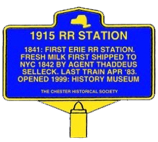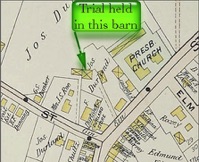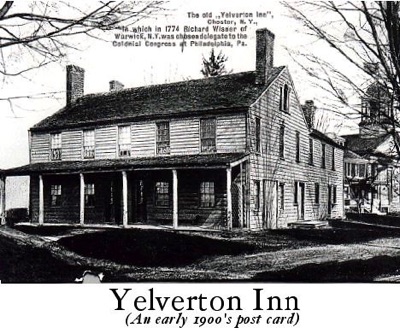EXPLANATORY NOTE OF THE PROCEEDING
This suit was brought because the grant of the Wawayanda Patent was not explicit enough to say where it began and where it ended. It reads being bounded on the eastward by the High Hills of the Highlands and the Patent of Capt. John Evans, on the north by the division line of the Counties of Orange and Ulster, on the westward by the High Hills to the eastward of Minisink and on the south by the division of the Provinces of New York and East Jersey. The Wawayanda patentees claimed that their line was on top of the Schunnemunk and Warwick Mountains. This patent was granted in 1702 and dated April 27. The Minisink patent first appears Jan. 13, 1704. In 1687, 1695, 1696, 1697 there were several patents granted in the lower part of what is now Rockland, then Orange County These patents extended way up in the Ramepough Valley, in 1710 the Capt. Evans patent was annulled end the Crown resumed the ownership. The bounds of Orange and Ulster Counties were not at this time laid out, and the division line of the two counties was not surveyed for a generation. As late as 1754 the Minisink and Wawayanda patentees had a strife before the Colonial Council, so it can easily be seen that the bounds of the Wawayanda patent were very indefinite. About the year 1707 the proprietors of the Cheesecocks patent discovered a large tract of land lying between the Honan and Howden patents (which were granted in 1704), Wawayanda patent and East Jersey line.
The Evans patent was canceled because it was too large. Capt. Evans having died, his widow did not have influence enough to hold it. The Wawayanda patent covered 194,417 acres, Cheese-cocks 75,000, or, as they contended in their suit 127,870 acres. Cheesecocks contention was that the Wawayanda patent did not extend over the crooked mountains as they ran but on a straight line which would bring their line near Wickhams Pond. Both patentees began selling land and after some 75 years of this contention this suit was brought. It was referred to a commission to decide where the line was between the two patents and I believe the commissioners were appointed by the courts of Suffolk County and their findings are probably on file in the clerks office of that county.
If Capt. Evans’s widow had the pull that the widows of Dr. Bridges and Christopher Deane had she might have saved her patent, but there were too many who were looking with longing eyes up to this fine tract plunder.
“Burr and Hambleton,” who appeared as attorneys for the Wawayanda patentees, were Aaron Burr and Alexander Hamilton, both of whom loom large in the history of the Revolution, Hamilton having been the first Secretary of the Treasury to be appointed by President George Washington while Burr served with distinguished gallantry in the American army.
In 1804 they fought a duel at Weehawken in which Hamilton was fatally wounded.
The trial was held in the Yelverton barn at Chester, now the property of Frank Durland.
CHESTER, located as it is on the Kings Highway between New Windsor and North Jersey, is in the course traveled by the earliest settlers. Chester naturally is proud of the fact that the noble George Washington was entertained at its public inn on his way from Philadelphia to join the main army at the Hudson River on July 27, 1782, as is recorded in General Washington’s expense account filed in Washington, D. C.
The early settlement of Chester, in the precinct of Goshen until 1845, is included in the land grant from Queen Anne, dated March 5, 1703, and called the Wawayanda patent. All local histories give the date as March 5, for the original papers state the following: “It was necessary, before the granting of the patent by the government, that the Indian ground right should be extinguished. So on March 5, the twelve Indian chiefs of the twelve tribes then living on this patent sold outright their title for consideration of money and goods. The Indians did not come on this land again to battle but April 29th of that same year is the date of the granting of the patent by Queen Anne. The Wawayanda patent covers about one-half of Orange County, as will be seen from the following quotation of the original land grant: “It was bounded on the eastward by the high hills of the Highlands and patent lands of Capt. John Evans, on the north by the line which divides Orange and Ulster, on the westward by the high hills to the eastward of the Minisink, on the south by the division line of the Province of New York and east New Jersey. The reason that the indefinite description of the land grant is cited here is that in 1785 the hearing, to determine finally the definite boundaries of the grant, was held at the Yelverton Inn in Chester.
The record states that Philip Rockby sold his undivided interest in this Wawayanda patent on June 16, 1704 to Daniel Cromline and two others. Again, Hendrick Teneyck on Dec. 8, 1704 sold his undivided interest in the same patent to Cromline and ten years later Cromline sold two thirds of his purchase to Messrs. Everett and Clews, retaining one-third or 1706 acres, English measure. This is the tract of land which is now the township of Chester, embracing the site on which Cromline made a settlement. In 1716 he erected the first dwelling to which he gave the name Greycourt. This dwelling house mentioned was located on the road from Chester to Craigville, not far from the Greycourt cemetery and it, known as the Cromline House or the Greycourt Inn, was probably the main public building between New Windsor and New Jersey prior to 1765, when the Yelverton Inn was opened.
About 1721 John Yelverton of New Windsor came to this section. In later years he purchased land and erected the first dwellings of which we have any record today. The following is taken from a copy of the original deed recorded by his grandson and executor, Abijah Yelverton. The deed conveys three parcels of land in Goshen to John Yelverton in trust “for a Parsonage, Minister's House, a burying place; also to build a Meeting House thereon or public edifice for the worship of God in a way and manner of those of the Presbyterian persuasion, signed by 24 land owners in the different parts of this Wawayanda patent. The Meeting House mentioned has reference to the Goshen Presbyterian Church of 1720.
The following years must have been trying times for the families in this valley. The hour was fast approaching when it was to be determined whether the French or the English would govern the country. One John Beers owned 120 acres of the Cromline patent and sold the same, June 16, 1751, to John Ensign who, in turn, sold 42 3/4 acres on May 19 1755 to John Yelverton, yeoman, for the sum of 97 Pounds, 4s., current money and on this land the old village of Chester is located.
During the twenty years preceding the evolutionary war, this land was cleared rapidly and many houses were built. Several familiar names of the families living in our township today are found on the assessment of district No. 4, town of Goshen, which was signed by Nathaniel Roe in 1775. This district may be described as running from old Greycourt to Satterlytown, to Sugar loaf, to Summeryule, to Fort Hill, with no less than 119 landowners and with an assessment of 370 Pounds, 8s, l/d.
On this land purchased by John Yelverton, the Old Yelverton Inn which is still standing, was built in about 1765. During the following days of the Revolutionary War and even later this inn was kept by his grandson, Abijah who died in 1832. Among the Yelverton deeds in my possession there are three separate deeds which show that Abijah Yelverton was an Innkeeper at this time; the deed, under date of December 28, 1775, between John Carman to Abijah Yelverton, Innkeeper, precinct of Goshen lands in New Windsor, the deed, under date of June 16, 1778, between Abijah Yelverton, Innholder, to Peter Townsend of the same place, a part of the Cromline tract known as Lot No. 4 of 200 acres This deed was acknowledged before Judge Elihu Marvin in who lived at Chester. And under date of May 1, 1794 Abijah Yelverton, Innkeeper, sold to Oliver Smith lot No. 14 in subdivision where he now lives mentioned in a field book made by Abel Gale”
It was from this Yelverton Inn while Abijah Yelverton was the Innkeeper that the fist delegate was sent to the Continental Congress at Philadelphia. “On the third day of September, 1774, a meeting of the inhabitants of the precincts of Goshen and Cornwall in the County of Orange, Province of New York, were assembled in Chester and Henry Wisner by a majority of votes, was sent to the Continental Congress held in Philadelphia to protest against unjust taxation.”
On July 18, 1775 Congress enacted the first Militia law “which recommended to the inhabitants of all the United English Colonies in North America that all able bodied effective men between sixteen and fifty years of age in each colony might form themselves in regular companies of Militia." (Public Papers of George Clinton, published by the State of New York—Vol. I, Page 120) Very soon after this law was enacted by Congress, the Chester Company of Militia was organized for the records show that in 1775 this Company was organized and attached to Colonel Allison’s Goshen Regiment which was officered as follows: Capt. John Jackson, Lieut. John Wood, Lieut. James Miller and Ensign James Parshall.
What stirring times there must have been at the Yelverton Inn during the month of December 1776, when the troops of Orange and Ulster gathered at the square at Chester on their way to join Generals Lee and Gates. The authentic record of the troops gathering at the Yelverton Inn is found in the following extract, from the Public Papers of George Clinton, by John McKesson, Secretary. (Clinton’s Papers—Vol. I. Page 120.) In Committee of Safety for the State of New York, Fishkill, December 9, 1776, it was resolved “that all the Militia of Orange and Ulster Counties be ordered to march, properly armed and accoutred, and with four days provisions to Chester in Orange County and there to receive further orders.” The following day, December 10, 1776, Brigadier General George Clinton was ordered by Secretary John McKesson “to assemble the militia of your Brigade as soon as possible at Chester in the county of Orange and to march them from thence into the state of New Jersey to cooperate with General Lee. (Clinton’s Papers—Vol. I, Page 460). Another reference of the meeting of the troops in Chester was made by Colonel Allison of the Goshen regiment in a letter written Dec. 12, 1776 (Clinton’s Papers—Vol. 1, Page 467.) Again on April 7, 1777 Col. Woodhull, with his regiment, halted at Chester on his way from New Windsor to New Jersey and they were at Camp in Chester awaiting sufficient guard to protect their baggage before continuing their march south. Later, during the troublesome times at Minisink each Captain was ordered “to send his men to Chester, the Thursday following Dec. 4, 1778, to march under the command of Capt. Tuthill to Minisink.” (Clinton’s Papers—Vol. IV Page 570.)
It was in February of the year 1776 that the Goshen Regiment was reorganized under the following officers: Col. William Allison, Lieut. Col. Benj. Tusten, Major Moses Hetfield; Adj. John Wood. Capt. John Jackson remained in command of the Chester Company until February 26, 1778, when Adj. John Wood was promoted to the Captaincy in his stead. This regiment participated in the engagements of Fort Clinton and Fort Montgomery and at the Battle of Minisink on July 22, 1779. In the latter engagement the Chester Company suffered heavy losses. Privates Benj. Dunning and Ephram Masten and Gilbert S. Vail were killed. Capt. John Wood was wounded and taken prisoner. I am unable to find further records showing the names of noncommissioned officers and privates in the Chester Company. The foregoing official orders for the Militia to meet in Chester fixes the date of the encampment on the ridge above the Yelverton Inn, as being the winter of 1776 and the Spring of 1777. At this time the Townsend family, who lived opposite the present Presbyterian Church in Chester, owned and operated the Sterling Furnace.
After Fort Montgomery was taken, in 1777, and the chain across the Hudson River was broken by the English the government was still of the opinion that the river could be obstructed in this manner and sent Mr. Pickering, Secretary of War, to Chester to consult Mr. Townsend. The contract was let, and after a series of great delays the chain was made at Sterling and finally drawn across the Hudson River at West Point on April 30, 1778. “The contract for this chain was made by Hugh Hughes, Deputy Quarter Master General, with Mr. Peter Townsend at his home in Chester of the firm Noble Townsend & Co. on February 2, 1778 (Clinton’s Papers—Vol. II, Page 708).
In 1785, after we had become an independent country, disputes over the boundaries of the Wawayanda and Cheesecock patents arose and led to the trial held at the Yelverton Inn. The decision of this boundary line was of more than usual importance because the titles of many homes were at stake. I quote from the minutes of this trial which are now on file in the Orange County Clerk’s Office:
“The hearing held in the Yelverton barn in Chester from May to October, 1785.” This record shows that the trial was held in the barn in the rear of the Inn, probably because the barn provided more space for the witnesses who were called together for the necessary evidence. Alexander Hamilton and Aaron Burr were the attorneys for the Wawayanda patentees and during their stay in Chester they were entertained at the Yelverton Inn. All through the summer, at convenient times, witnesses were swore. As we gather from their testimony, some came from long distances and evidently they were men who had lived in this section in earlier years. Each witness, as he was sworn, gave his age and his birthplace. We find among the many witnesses called to give testimony the following: “Adam Wisner, aged 86; Judge Ehiha Marvin, aged 76; Daniel Burt, 44 years; Nathaniel Satterly, 53 years; James Board, 65 years; Thomas Welling, 67 years; Cadwallader Colden, 63 years; Hugh Dobbin, 76 years; Stephen Sloat, 57 years; Samuel Moffat, 81 years; and Joseph Terry, Sr., 68 years.”
In 1783 Abijah Yelverton, Innkeeper, gave an acre of land for church purposes. The year 1797 saw the beginning of the first meeting house and in 1798 the first minister began his labors at $75.00 per annum, “with the privilege of teaching school to piece out his support.” Chester’s first public library was incorporated with seven trustees, Nov. 17, 1797. This organization was verified before Judge Wickham in Goshen and recorded in 1797. Abijah Yelverton, innkeeper, was appointed the Librarian.
Long before the sounds of automobiles and trains were heard, the mails were brought by stage coach over the old trail we have come to know as the Kings Highway. Chester was favorably located for the exchange of mails since the Goshen coach ran through to meet the New York and Newburgh coaches and the Warwick coach used the same trail through Chester to connect with those already mentioned. The Kings Highway, running from New Windsor to North Jersey, passed along side of the Yelverton Inn. According to the survey on file in the County Clerk’s Office, this highway was laid out in 1735, during the reign of George II of England. The survey reads in part: “At the request of Benjamin Aske and others a certain Kings road of forty rods wide was laid out on Nov. 20, 1735
The old Yelverton Inn, around which all of these historical events are centered, was owned in the Yelverton family for six generations in direct line; John (emigrant before 1700), John Jr., Abijah, Anthony, John H., and Thomas. James W. Yelverton, who represented Schenectady County in the State Senate when our own Senator John U. Stivers represented Orange County, is the seventh generation in this family. Since 1869, this property as been in the Durland family.
Because of these several authentic reports of important historical events having taken place at the old Yelverton Inn, are we not entitled to have this historic spot permanently marked that the local history of our vicinity may be remembered?
Since this article was read before the Wallkill Historical Society of Middletown, N. Y., the Minisink Chapter of the D. A. R. of Goshen, N. Y. has voted to mark the Inn with a suitable tablet, which will be unveiled in June of 1927.
Yelverton Inn
by
Frank Durland
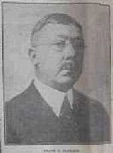
"The story of Yelverton Inn at Chester, N. Y. was read by Mr. Frank Durland at the March 1926 meeting of the Middletown Historical Society and the Wallkill Precinct, Inc., at Middletown, and is printed in the interest of preserving historical data of Orange County. The Inn was once visited by General George Washington and was later the home of his son, W. Sanford Durland." (Warwick Valley Dispatch Press, 1926)
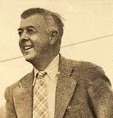
Frank Durland
W. Sanford Durland
"Atlas of Orange County, New York” A.H. Mueller & Co., 528 and 530 Locust Street, Philadelphia, PA., 1903. Plate 20.
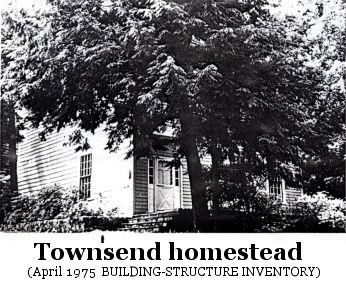
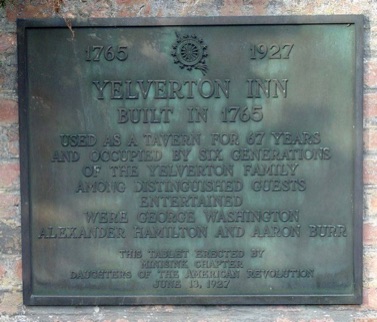
Tablet reads:
1755 1927
YELVERTON INN BUILT IN 1765
Used as a Tavern for 67 years and occupied by six generations of the Yelverton family. Among distinguished guests entertained were George Washington Alexander Hamilton and Aaron Burr
This Tablet erected by Minisink Chapter Daughters of the American Revolution June 13, 1927
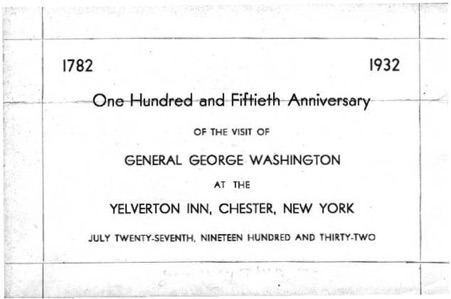
THE location of the Yelverton Inn in Chester, on the King's Highway midway between Northern New Jersey and Newburgh, was a convenient stopping place during the Colonial period of Orange County. It was here that General George Washington and his aides were entertained on one of his trips, on July 27, 1782, from Philadelphia to Newburgh, to meet with Count Rochambeau.
Abijah Yelverton, from the year 1765 until his death in 1832, lived in this home and, as stated in all his legal papers, was known as "Innkeeper." As early as November 17, 1797, a public libary was established in this Inn with a circulation of 100 copies. Abijah Yelverton was appointed Librarian, verified and recorded in Goshen by Judge Wickham.
"On the third day of November, 1774, a meeting of the inhabitants of the precincts of Goshen and Cornwall, in the County of Orange, Provience of New York, were assembled in Chester at this Inn and by a majority of the votes Henry Wisner was sent to the first Continental Congress in Philadelphia to protest against unjust taxation."
In the papers of General George Clinton published by New York State we find the Continental troops in this section were ordered to assemble at Chester no less than four different times.
In 1785, disputes having arisen over the boundaries of the Wawayanda and Cheese cocks patents, which led to a trial which was held at Yelverton Inn. The proceedings continued from May to October of that year. During this long trial Alexander Hamilton and Aaron Burr were the counsels for the Wawayanda patentees and during their stay in Chester were entertained at this Inn.
In 1783 the records show that Abijah Yelverton gave an acre of ground for Church purposes and later, in 1798, the First Presbyterian Church was erected close by the present Inn.
The present tablet was erected by the Minisink Chapter, of Goshen, Daughters of the American Revolution, June 13, 1927.
We are today celebrating the 150th Anniversary of the visit of General Washing ton at this home.
The Inn is now the home of Mr. and Mrs. W. Sanford Durland.
